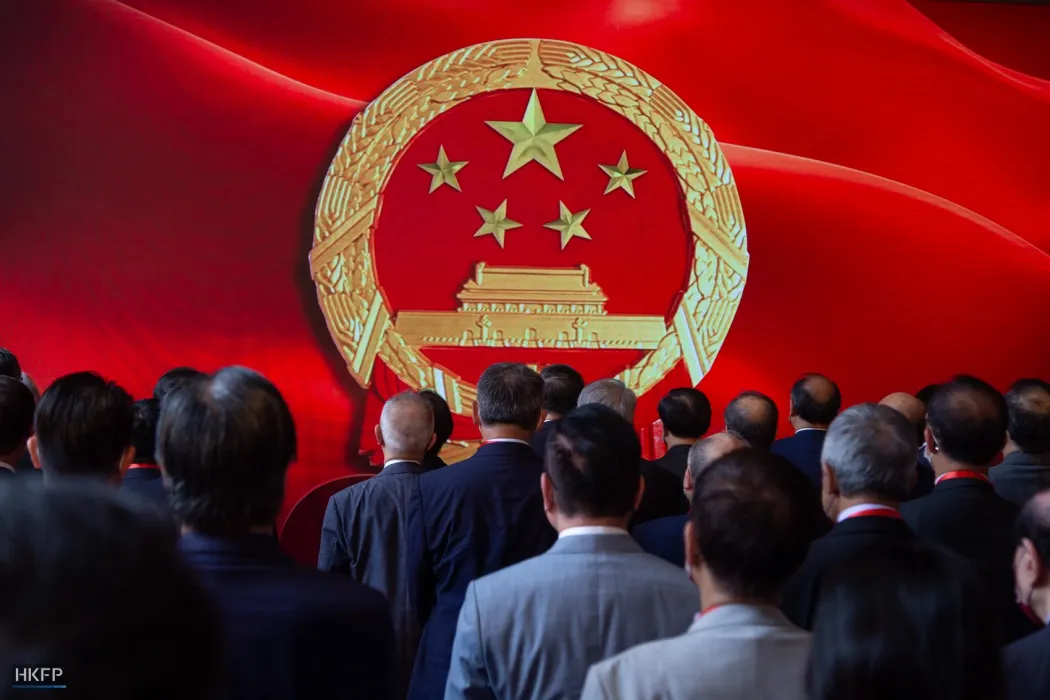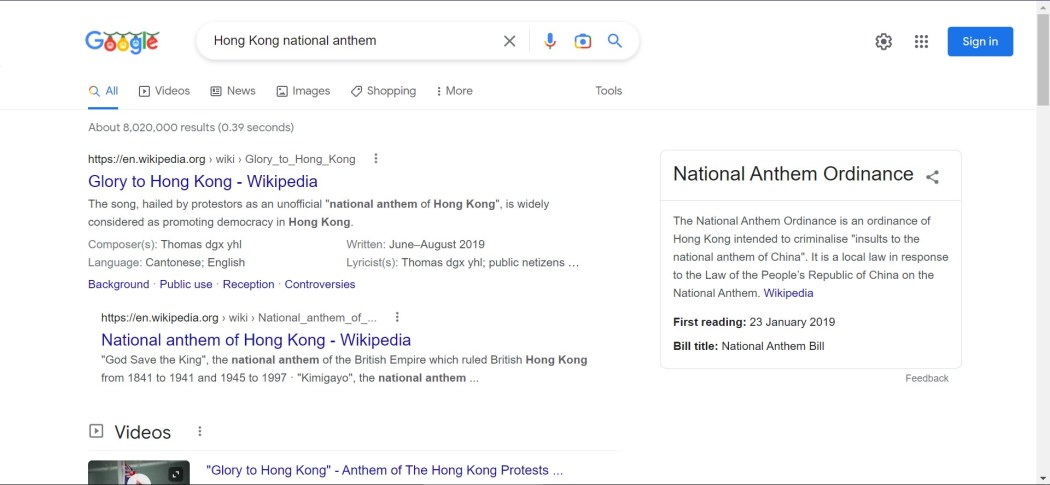Google should remove inaccurate search results related to Hong Kong’s national anthem, Chief Executive John Lee has said, citing policies implemented by the tech giant related to removing content for legal reasons, and taking down results that “misrepresent” or “mislead.”

The weeks-long controversy over Hong Kong’s national anthem began when the 2019 pro-democracy protest song “Glory to Hong Kong” was played instead of China’s national anthem “March of the Volunteers” ahead of a rugby match in South Korea. Staff had reportedly played the top listed song after searching for “Hong Kong national anthem” online.
In the days that followed, reports of several other anthem blunders emerged.
Earlier this month, Security Chief Chris Tang said that Google had refused to comply with a request from the Hong Kong government to change related search results, saying they were generated by an algorithm with no human intervention.
When HKFP searched for the phrase “Hong Kong national anthem” in English using incognito browsing mode on Tuesday, the top result was the Wikipedia page for Glory to Hong Kong, which the government says is associated with violent demonstrations.
‘A serious matter’
Speaking at a press conference before meeting the Executive Council on Tuesday morning, Lee said the misrepresentation of the anthem shared by the city and mainland China was “a serious matter.”
The chief executive added that Google had the means to change the search results. “It’s a question of whether Google choose[s] to do it. If he chooses not to do it, I think he has a lot to explain,” Lee said.

Lee said Google’s own policy stated that the company would remove content for legal reasons. Playing another song in the place of the “March of the Volunteers” is considered an offence in the city, as it “constitutes insult,” Lee said.
Hong Kong’s national anthem law, which criminalises insults to March of the Volunteers, was enacted on June 4, 2020 – violators risk fines up to HK$50,000 or three years in prison.
According to Google policy, the company scrutinises any requests to remove content on these grounds to ensure that they’re “well-founded.” “We frequently refuse to remove content when there’s no clear basis in law,” it stated.
Additionally, Lee said Google’s policy said that the company “will not allow content that misrepresents or misleads.”
“Obviously it misrepresents our Hong Kong national anthem,” the chief executive said, adding that he thinks “an organisation as big as Google will take things seriously.”

Responding to an enquiry from HKFP on Tuesday, Google said: “In keeping with our commitment to maximize access to information, we do not remove web results except for specific reasons outlined in our global policy documentation.”
“Google handles billions of search queries every day, so we build ranking systems to automatically surface relevant, high quality, and helpful information. We do not manually manipulate organic web listings to determine the ranking of a specific page.”
The tech giant said it would continue to engage with the Hong Kong government “and explain how our platforms and removal policies work.”
Black Hong Kong flag in Ukraine video
The chief executive was also asked for his response to a black Hong Kong flag being featured in a video published by the Ministry of Defense of Ukraine on Sunday.
The black version of the city’s regional flag, which was popular at pro-democracy protests in 2019, was featured among 52 “countries” the Ukrainian defence ministry thanked for their support since Russia invaded the country in February.
Lee said the government had been in contact with the Office of the Commissioner of the Ministry of Foreign Affairs over the matter and it would be dealt with “diplomatic means.”
Support HKFP | Policies & Ethics | Error/typo? | Contact Us | Newsletter | Transparency & Annual Report | Apps
Help safeguard press freedom & keep HKFP free for all readers by supporting our team

LATEST FROM HKFP
HKFP has an impartial stance, transparent funding, and balanced coverage guided by an Ethics Code and Corrections Policy.
Support press freedom & help us surpass 1,000 monthly Patrons: 100% independent, governed by an ethics code & not-for-profit.










